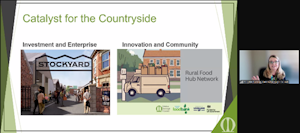T: 01822 851370 E: [email protected]
Visit RSN Survey about life in rural England to find out more.
Reframing the Rural Economy
 Rural communities are not just surviving—they are striving to shape their own economic futures. That was the clear message from last week’s RSN member exclusive seminar on the Rural Economy. The session brought together local authority members, national experts, and rural leaders to explore how innovation, investment, and collaboration can unlock rural potential—and what’s standing in the way.
Rural communities are not just surviving—they are striving to shape their own economic futures. That was the clear message from last week’s RSN member exclusive seminar on the Rural Economy. The session brought together local authority members, national experts, and rural leaders to explore how innovation, investment, and collaboration can unlock rural potential—and what’s standing in the way.
RSN Chief Executive Kerry Booth opened the seminar by calling for a national shift in how rural areas are understood and supported. She highlighted long-standing inequalities in government funding—urban councils receive around 40% more per head than rural areas—and pointed to research showing rural England could contribute an additional £19 billion to the Treasury with the right support. But to get there, Kerry argued, rural areas need more than warm words—they need a clear, dedicated plan and fair metrics that truly reflect rural realities.
Innovation in Action: Melton’s Bold Regeneration Vision
 One of the highlights of the seminar was a presentation from Lydia Rusling, Director of Place and Prosperity at Melton Borough Council, who showcased the council’s ambitious Stockyard development. The project aims to reimagine a key council-owned site into a vibrant food and drink destination, boosting Melton’s claim as the "Rural Capital of Food."
One of the highlights of the seminar was a presentation from Lydia Rusling, Director of Place and Prosperity at Melton Borough Council, who showcased the council’s ambitious Stockyard development. The project aims to reimagine a key council-owned site into a vibrant food and drink destination, boosting Melton’s claim as the "Rural Capital of Food."
Backed by funding from the UK Shared Prosperity Fund and Rural England Prosperity Fund, the Stockyard will support local producers, drive visitor numbers, and act as a platform for wider regeneration.
Lydia was honest about the challenges—from inflation and changing political leadership to the need to carefully balance town centre concerns. Her message was clear: rural transformation takes vision, partnerships, and perseverance.
A Strategy That Works for All Places
Alex Howell from the Local Government Association (LGA) spoke about how the government’s developing Industrial Strategy must include rural places at its core—not just in theory, but in funding, planning, and delivery. He stressed that rural councils face particular challenges, from underinvestment in infrastructure to limited business premises and the ongoing “brain drain” of young people.
Alex argued that empowering local government through place-based plans, long-term growth settlements, and better data could bridge these gaps. He also noted that the UK’s rural and coastal areas face a £102 billion productivity gap—a stark figure that underscores the urgency of action.
Pubs with a Purpose: Social Value and Community Connection
 John Longden, Chief Executive of Pub is the Hub, offered a valuable insight into rural economic resilience. Far from being just places for a pint, rural pubs can be lifelines—providing essential services, reducing isolation, and building local pride.
John Longden, Chief Executive of Pub is the Hub, offered a valuable insight into rural economic resilience. Far from being just places for a pint, rural pubs can be lifelines—providing essential services, reducing isolation, and building local pride.
John shared examples of pubs that have evolved into mini-community hubs offering everything from post offices to IT classes. According to his team’s calculations, every £1 invested in such projects creates £8–£9 of social value.
Yet despite growing interest, over 40 community projects are currently on hold due to lack of funding—an all-too-familiar story in rural development.
Looking Ahead: Next RSN Seminar on Rural Transport – 4 June 2025
The Rural Economy seminar is part of RSN’s 2025 Seminar Series, offering RSN members exclusive access to expertise, best practice, and peer discussion.
The next session will focus on Rural Transport, a vital enabler of rural prosperity, and will take place on Wednesday, 4th June 2025.



